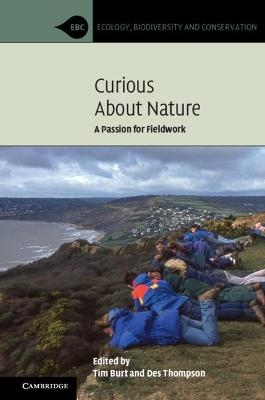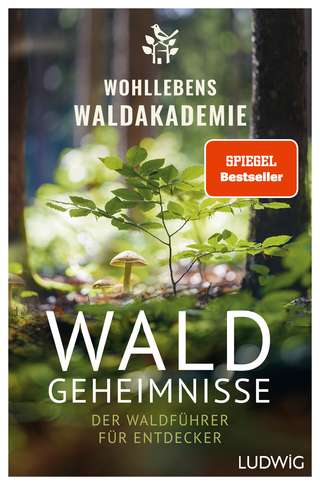
Curious about Nature
Cambridge University Press (Verlag)
978-1-108-42804-0 (ISBN)
Notwithstanding the importance of modern technology, fieldwork remains vital, not least through helping to inspire and educate the next generation. Fieldwork has the ingredients of intellectual curiosity, passion, rigour and engagement with the outdoor world - to name just a few. You may be simply noting what you see around you, making detailed records, or carrying out an experiment; all of this and much more amounts to fieldwork. Being curious, you think about the world around you, and through patient observation develop and test ideas. Forty contributors capture the excitement and importance of fieldwork through a wide variety of examples, from urban graffiti to the Great Barrier Reef. Outdoor learning is for life: people have the greatest respect and care for their world when they have first-hand experience of it. The Editors are donating all royalties due to them to the environmental charity, The Field Studies Council, to support student fieldwork at the Council's field centres.
Tim Burt retired as Master of Hatfield College and Professor of Geography at the University of Durham in 2017. His research focuses on catchment hydrology, water quality and climate history. Burt has run the two oldest university weather stations in the UK: the Radcliffe Observatory in Oxford (dating from 1767), and the Durham Observatory (from 1850). President of the Field Studies Council and editor of its journal Field Studies, Burt was awarded the Linton Medal by the British Society for Geomorphology in 2017. He is an elected Fellow of the American Geophysical Union and the British Society for Geomorphology. Des Thompson is the Principal Adviser on Science and Biodiversity with Scottish Natural Heritage. With particular interests in field ecology, his books cover a broad range of interests including birds of prey, shorebirds, alpine and upland habitats, and the Cairngorms and other mountain areas. Thompson chairs the Technical Advisory Group advising the UN Convention on Migratory Species on the conservation of migratory raptors in Africa and Eurasia. Awarded the Chartered Institute of Ecology and Environmental Management's (CIEEM) Medal in 2019, Thompson is Chairman of the Field Studies Council, and is an elected Fellow of the CIEEM and the Royal Society of Edinburgh.
Part I. Getting Curious about Nature: 1. Fieldwork and nature: observing, experimenting, and thinking Tim Burt and Des Thompson; 2. The place of field studies in environmental science Michael Church; 3. The history of field work in the geosciences Andrew S. Goudie; 4. Pioneering fieldwork heroes in the life sciences Stephen Trudgill; 5. The educational benefits of out-of-classroom learning Michael J. Reiss; Part II. Inspiring Fieldwork: 6. Understanding the decline of hen harriers on Orkney Arjun Amar; 7. Rocky shores are not just for the able-bodied John Archer-Thomson; 8. Life, love and longing to survive Alison Averis; 9. Bringing palaeoecology alive Hilary H. Birks; 10. Expedition botany / hobby botany John Birks; 11. The Illisarvik drained-lake field experiment: a legacy of J. Ross Mackay Chris Burn; 12. In praise of meteorology field courses Stephen Burt; 13. Time, place and circumstance Tim Burt; 14. Sampling fish diversity along a submarine mountain chain Ingvar Byrkjedal; 15. Place and placefulness Richard Carrick; 16. Ripples across the pond Stuart Corbridge; 17. Fieldwork, field-friends, and the paradox of absence Douglas Davies; 18. Ornithological fieldwork – essential and enjoyable Roy Dennis; 19. Exploration science on the shore of the Arctic Ocean – a personal experience David J. A. Evans; 20. Only connect – and make records Alastair Fitter; 21. Studying patterned bogs David Goode; 22. Mapping the rise of the animals: Cambrian bodies in the Sirius Pass, North Greenland David A. T. Harper; 23. Evolution in the cellar: live-trapping wild house mice in the Italian Alps Heidi C. Hauffe; 24. Reflections on 'babooning' Russell Hill; 25. Bogs, birds and bones: interdisciplinary fieldwork on the Isle of RuÌm NNR Peter Higgins; 26. Exploring world(s) down under Emily Husband; 27. Experiments by nature – strength in realism Christian Körner; 28. Big problems – small animals Charles J. Krebs; 29. Soil survey: a field-based science Allan Lilly; 30. A traveling ethnography of urban technologies Andrés Luque-Ayala; 31. My date with the devil Peter Marren; 32. Peregrinations through the heathlands and moorlands of Britain: an applied plant ecologist's tale Rob Marrs; 33. The Maimai catchment New Zealand Jeff McDonnell; 34. 'Writing in the field' – the importance of a local patch Stephen Moss; 35. Looking but not seeing – how sketching in the field improves observational skills in science Stephen Mott; 36. From rum to recording forest soils via the Soil Survey of Scotland – a life of fieldwork Andrew J. Nolan; 37. In praise of bat detectors Kirsty Park; 38. In search of Tawny Frogmouths Stuart Rae; 39. Don't just sit there reading … Jane M. Reid; 40. Fieldwork in the Australian bush – if it doesn't kill you, it'll convert you Lisa Robins; 41. Field studies of behaviour and life-changing events Leigh W. Simmons; 42. Sediment, wind turbines, and rhinos: ah, the life of a geographer! Mike Slattery; 43. Conservation science – the need for a new paradigm founded on robust field evidence William J. Sutherland; 44. The worst journey in the world Des Thompson; 45. Field-less fieldwork in archaeology's digital age Andrew Tibbs; 46. Reflections on a career with FSC Sue Townsend; 47. My love-affair with rocks that fizz Maurice Tucker; 48. In the footsteps of John Wesley Powell – restoring the sand bars in the Grand Canyon Alan Werritty; 49. Connecting the next generation to their world Natalie White; 50. Beyond the curriculum – wider conceptions of learning in the field Lewis Winks; Part III. Reflections and where next for field studies: 51. Conclusion: inspiring, curious and novel fieldwork Tim Burt and Des Thompson.
| Erscheinungsdatum | 21.02.2020 |
|---|---|
| Reihe/Serie | Ecology, Biodiversity and Conservation |
| Zusatzinfo | Worked examples or Exercises; 129 Halftones, black and white; 10 Line drawings, black and white |
| Verlagsort | Cambridge |
| Sprache | englisch |
| Maße | 158 x 235 mm |
| Gewicht | 810 g |
| Themenwelt | Sachbuch/Ratgeber ► Natur / Technik ► Natur / Ökologie |
| Naturwissenschaften ► Biologie ► Botanik | |
| Naturwissenschaften ► Biologie ► Ökologie / Naturschutz | |
| ISBN-10 | 1-108-42804-5 / 1108428045 |
| ISBN-13 | 978-1-108-42804-0 / 9781108428040 |
| Zustand | Neuware |
| Informationen gemäß Produktsicherheitsverordnung (GPSR) | |
| Haben Sie eine Frage zum Produkt? |
aus dem Bereich


